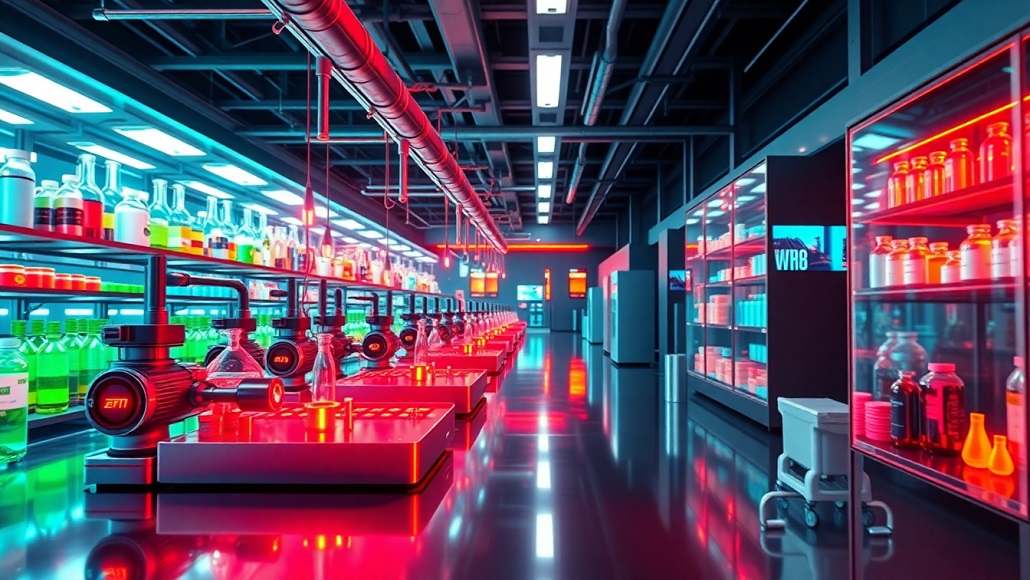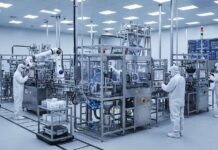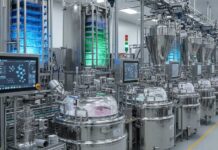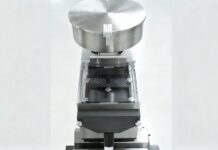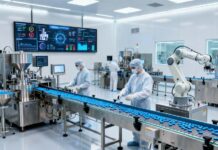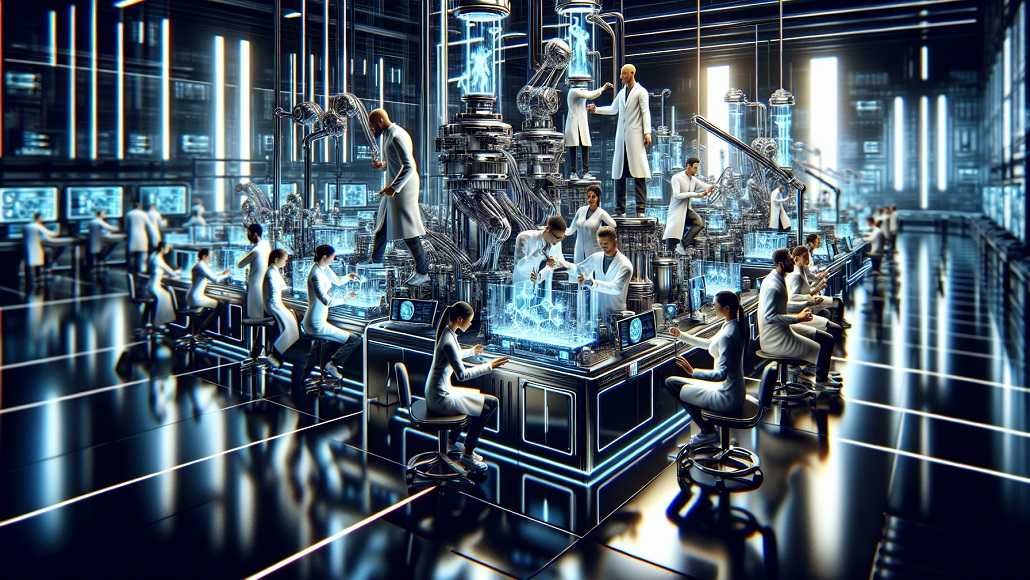There is no shred of doubt when we say that the pharmaceutical industry is going through a radical transformation with artificial intelligence being positioned at its center. The AI-driven biomanufacturing adoption is not just elevating the production efficiency and quality, but it is also redefining the way drugs and therapies are being developed. As the pharmaceutical products become more intricate and the worldwide demand when it comes to customized medicines intensifies, the integration of artificial intelligence within the manufacturing process could be both timely and essential.
By way of leveraging advanced algorithms, machine learning, and data-driven insights, the AI-driven biomanufacturing is taking into account challenges that have plagued the industry for a long time. By way of improving the process capability and decreasing the production timelines in order to ensure compliance with strict regulatory requirements, artificial intelligence is fast becoming a crucial enabler when it comes to excellence and innovation within pharmaceutical production.
Role of artificial intelligence in biomanufacturing
Biomanufacturing, which is AI-driven, takes into account the power of artificial intelligence in order to optimize the production processes within the biopharmaceutical gamut. It is well to be noted that traditional biomanufacturing methods often happen to depend on manual oversight along with empirical knowledge, which can have inferences leading to inefficiencies, variability, and even human error. Artificial intelligence, on the other hand, provides the capacity to evaluate complex data sets, anticipate outcomes, and execute real-time choices by making sure of greater precision and consistency.
One of the most transformative applications within artificial intelligence happens to be process control. By way of rolling out machine learning models, manufacturers can track process parameters, which are very critical, and also anticipate any kind of deviations before they even occur. For example, artificial intelligence systems can evaluate variables like pH levels, temperature, and nutrient supply within bioreactors to make sure that optimal conditions when it comes to cell growth and protein production are met. This kind of proactive approach lessens the possibility of a batch failure and also maximizes the overall yield, thereby prominently enhancing the process efficiency.
Apart from this, artificial intelligence is also helping manufacturers to shift from the traditional batch processing to continuous biomanufacturing. Continuous processes that happen to depend on real-time tracking and adjustments are inherently more cost-effective as well as efficient as compared to batch operations. Due to AI-driven systems offering real-time insights as well as control, the shift to continuous biomanufacturing has become increasingly feasible, thereby paving the way for much faster and more scalable methods in production.
Elevating quality along with compliance
It is worth noting that quality assurance happens to be the center point of pharmaceutical manufacturing, and artificial intelligence is playing a major role in making sure that the product quality along with regulatory compliance are met. When it comes to AI-driven biomanufacturing, machine learning algorithms are often used in order to detect any kind of anomalies or patterns within the production data, thereby helping with early identification of issues pertaining to quality. This kind of productive capacity not just decreases the risk of defective products, but it also elevates the entire process’s robustness.
The AI’s integration into the quality control process has been especially impactful in terms of the production of biologics, where even minor deviations can go on to compromise the integrity of the product. For instance, AI models can evaluate spectroscopic data in order to track protein folding and aggregation by making sure that biologics meet the strict standards of quality.
It is well to be noted that regulatory compliance is yet another area where artificial intelligence is making a prominent effect. The USFDA & EMA, which happen to be important regulatory agencies, are increasingly stressing the significance of data integrity along with accessibility in biomanufacturing. AI-driven systems, which help automate data collection, its evaluation, and reporting, enable the manufacturers to meet these requirements with greater ease and precision. By way of offering overall documentation and real-time tracking, AI systems can even streamline the compliance process, thereby reducing the regulatory risks and also inculcating confidence within stakeholders.
Productive analytics and its power
One of the defining features of AI-driven biomanufacturing is the usage of predictive analytics in order to optimize decision-making as well as resource allocation. Predictive models, which happen to be trained in terms of historical as well as real-time data, enable the manufacturers to predict production outcomes and also make informed decisions so as to prevent any kind of inefficiencies. One of the applications of predictive analytics happens to be supply chain management. By way of evaluating data in terms of raw material availability, production schedules, and demand forecasts, AI systems can speed potential disruption and also recommend if there are any contingency plans. This kind of capacity is especially valuable in the context of biopharmaceutical production, where supply chain interruptions can lead to expensive delays as well as shortages.
It is worth noting that predictive analytics is also shifting maintenance practices within biomanufacturing facilities. Traditional maintenance strategies, which depend heavily on fixed schedules as well as reactive interventions, often lead to unnecessary downtime or even equipment failures. AI-driven predictive maintenance, on the other hand, makes use of sensor data in order to track equipment health and also anticipate if, in case, any kind of maintenance is required. This kind of proactive approach lessens the downtime and also extends the lifespan of the equipment, thereby reducing the operational expenses.
Speeding up innovation in customized medicine
The rise of customized medicine is also reshaping the pharmaceutical spectrum, and AI-driven biomanufacturing is playing a very important role in helping this paradigm shift. Customized therapies, which are tailored to individual patients or small populations, need scalable and flexible production processes that can accommodate any kind of variability. The ability of AI to evaluate patient data and also personalize production workflow makes it a perfect solution for this barrier.
For example, when it comes to cell and gene therapy manufacturing, artificial intelligence happens to be used in order to optimize cell culture conditions as well as anticipate patient responses to the treatment. Machine learning models can evaluate the genomic and phenotypic data in order to pinpoint the most effective parameters in manufacturing, as far as individual patients are concerned, and make sure of a consistent quality along with efficacy.
AI also happens to be helping in the development of modular as well as decentralized biomanufacturing facilities, which are best suited in terms of producing customized therapies. These kinds of facilities make utmost use of real-time tracking as well as automated control systems in order to adapt the production process to certain therapeutic requirements. By helping greater flexibility along with efficiency, AI is enabling manufacturers to meet the rising demand for medicines that are customized in nature.
Cost efficiency and sustainability
Sustainability is increasingly becoming one of the priorities for the pharmaceutical industry, and AI-driven biomanufacturing adoption is indeed proving to be a very important ally in attaining the environmental objectives. Through optimizing resource utilization, along with reducing waste, artificial intelligence systems are enabling the manufacturers to reduce their carbon footprint.
For instance, AI algorithms can evaluate energy consumption patterns within the biomanufacturing facilities and also roll out certain measures to enhance efficiency and energy. In a similar way, AI-driven process optimization can decrease the raw materials usage by contributing to a much greater production practice.
Apart from promoting sustainability, AI is also driving cost-effectiveness within biomanufacturing. Through reducing the batch failures, improving the process capability, and making use of resource allocation, AI systems are prominently decreasing the cost of production. These savings not just benefit the manufacturers, but at the same time, make the biopharmaceutical products much more accessible to patients who need them the most by way of addressing crucial challenges within global healthcare.
What are the challenges and opportunities?
Well, while the potential when it comes to AI-driven biomanufacturing is massive, its adoption is not free of challenges. Integration of AI within existing production workflows needs prominent investment in data management, training of the workforce, and, of course, infrastructure. Manufacturers have to address challenges that are related to algorithm transparency, acceptance of certain regulatory measures, and also data security. In spite of the challenges, the opportunities that are presented by AI-driven biomanufacturing go beyond the risks.
In spite of the challenges, the opportunities that are presented by AI-driven biomanufacturing adoption far outweigh the risks. By making use of partnerships between academia, industry, stakeholders, and rigid bodies, one can overcome barriers in terms of adoption and unleash the full potential of AI within biopharmaceutical manufacturing.
It is well to be noted that a future of biomanufacturing happens to lie in harnessing the power of artificial intelligence to drive innovation, elevate the product quality, and, of course, enhance the efficiency. As the industry makes use of this transformative technology, it is poised to attain greater heights within therapeutic development along with global healthcare.
Conclusion
AI-driven biomanufacturing is indeed revolutionizing the production along with quality in pharmaceuticals. It is offering unmatched opportunities in order to elevate scalability, efficiency, and, of course, patient outcomes. Right from optimizing the process control and making sure of regulatory compliance to helping with customized medicine and, of course, promoting sustainability, AI is redefining the pharmaceutical spectrum. As this industry continues to make changes and evolve, the AI integration into biomanufacturing processes is going to become increasingly indispensable. By way of operating the technology, manufacturers can go ahead and address the challenges that have been long-standing and also meet the demand for innovative therapies by way of new yardsticks in terms of excellence in production as well as quality.
It is worth noting that in the years to come, without a shred of doubt, AI-driven biomanufacturing adoption will emerge as the center of pharmaceutical innovation by transforming the way drugs and therapies are developed, produced, and even delivered to patients across the world. For stakeholders throughout the biopharmaceutical spectrum, investment in artificial intelligence does not just give a strategic benefit, but it also happens to be a necessity in order to stay competitive in this ever-changing, lucrative sector.







